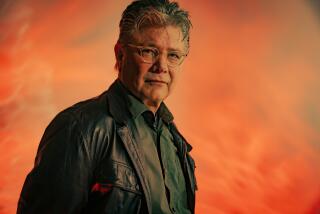Seeing Two Sides in Portrayals in ‘Beauty,’ ‘Ripley’
- Share via
Congratulations on printing Roger Kaufman’s fine essay about gay stereotyping (“It’s Time to Out Gay Stereotyping in Films,” Jan. 24). I have been waiting in vain for a word in print about the staggeringly obvious themes of “American Beauty.” Not a single reviewer nationwide caught what Kaufman can clearly see.
“American Beauty” is a movie by a gay writer about the stifling effects of heterosexual culture and marriage. It is, without doubt, a “thinly veiled coming-out story,” as Kaufman suggests.
Unfortunately, by cloaking the lead characters in heterosexuality, the film itself remains firmly in the closet. Perhaps these suppressed conflicts and passions are at the heart of “American Beauty’s” power. But the general perception that “Beauty” is tremendously avant-garde is false. It is firmly rooted in the sad mind-set that a mainstream movie must appear to be about heterosexual people and their problems to find an audience.
AMY HOLDEN JONES
Los Angeles
Regarding Roger Kaufman’s article, I must mention that Kenneth Turan’s remark in his review of “The Talented Mr. Ripley” about Tom Ripley’s homosexuality and how it should have been kept “just under the surface” was not, as Kaufman asserts, a “weird” suggestion. Turan was probably referring to the fact that in the book by Patricia Highsmith, Ripley was not a homosexual and that the movie suffered by Anthony Minghella’s making an issue of it.
Interestingly, Kaufman’s further observations on both “American Beauty” and “Ripley” are, in and of themselves, the most cliche of gay attitudes, that being: Everyone is secretly gay and everything has secret gay subtexts. The truth, Mr. Kaufman, is that straight people (who comprise the majority of the population) are not all that interested in movies and stories about gay people. Isn’t it possible that sometimes gay characters in movies are happy-go-lucky and sometimes they are evil, just like straight people?
ELLEN SAWYER
Los Angeles
I had another reaction to the characters in “American Beauty” and “The Talented Mr. Ripley,” whom Roger Kaufman experienced as “negative gay stereotypes.” I didn’t feel they were tortured, self-hating individuals because they were gay but instead because they had been lifelong victims of intolerance, exclusion and consequent repression.
I found the characters heartbreakingly sympathetic, and the message not that the villain was homosexuality but rather society’s stubborn inability to accept and assimilate anyone who is “different.”
BRIAN FARRELL
Los Angeles
“American Beauty,” a drama with many dysfunctional characters, managed to portray two individuals as “normal-functional” and at one point as “role models” to Kevin Spacey. Oh, by the way . . . they were the gay “cardboard couple” Kaufman referred to. Either he constantly views life through a “glass which is half empty” or he voiced his opinion with a “deck which wasn’t full.” Roger, lighten up!
MARTEN C. deROZARIO
Los Angeles
You say that the gay couple in “American Beauty” are just used for comic relief. I could understand why you would say this, since the rest of the movie was totally lacking in any sort of humor whatsoever. But it seems to me that they were the only happy, functional pair in the entire film. Hey, not too shabby for a gay couple living in suburbia like two normal people.
You say that when Kevin Spacey’s character wakens from his boring life it was a “thinly veiled ‘coming out’ story transferred onto a straight character.” That’s pretty much like saying that he used to be gay, then decided to be straight, and then remembered he was gay again. I don’t know if you noticed, but one of the movie’s themes was how great the innocence of youth is. He starts remembering what it was like to be young; he realizes his life is now a joke. The “forbidden” attraction to the young girl is simply a catalyst for his behavior.
I don’t understand why people have to try to find subtle innuendo and subliminal themes in “American Beauty.” It seemed to shout “Live Life Now!” pretty loud.
BRIAN WATSON
Camarillo
More to Read
Only good movies
Get the Indie Focus newsletter, Mark Olsen's weekly guide to the world of cinema.
You may occasionally receive promotional content from the Los Angeles Times.









